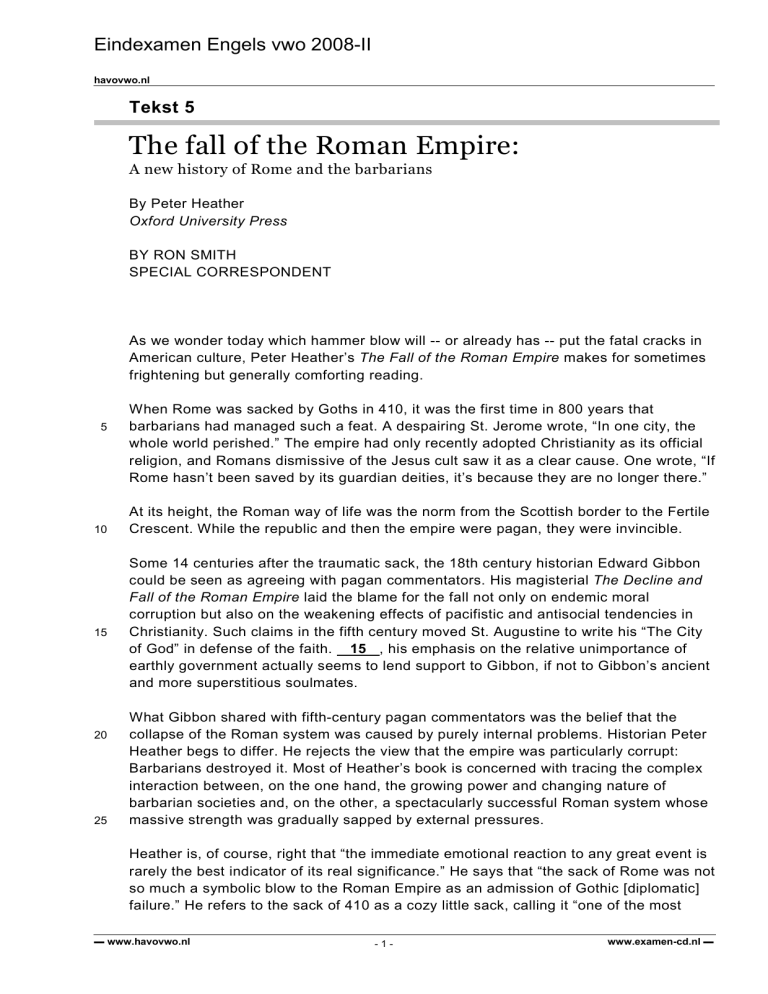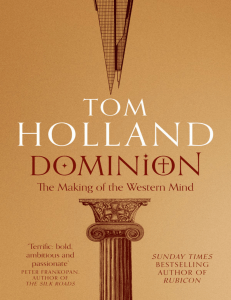
Eindexamen Engels vwo 2008-II
havovwo.nl
Tekst 5
The fall of the Roman Empire:
A new history of Rome and the barbarians
By Peter Heather
Oxford University Press
BY RON SMITH
SPECIAL CORRESPONDENT
As we wonder today which hammer blow will -- or already has -- put the fatal cracks in
American culture, Peter Heather’s The Fall of the Roman Empire makes for sometimes
frightening but generally comforting reading.
5
10
15
20
25
When Rome was sacked by Goths in 410, it was the first time in 800 years that
barbarians had managed such a feat. A despairing St. Jerome wrote, “In one city, the
whole world perished.” The empire had only recently adopted Christianity as its official
religion, and Romans dismissive of the Jesus cult saw it as a clear cause. One wrote, “If
Rome hasn’t been saved by its guardian deities, it’s because they are no longer there.”
At its height, the Roman way of life was the norm from the Scottish border to the Fertile
Crescent. While the republic and then the empire were pagan, they were invincible.
Some 14 centuries after the traumatic sack, the 18th century historian Edward Gibbon
could be seen as agreeing with pagan commentators. His magisterial The Decline and
Fall of the Roman Empire laid the blame for the fall not only on endemic moral
corruption but also on the weakening effects of pacifistic and antisocial tendencies in
Christianity. Such claims in the fifth century moved St. Augustine to write his “The City
of God” in defense of the faith. 15 , his emphasis on the relative unimportance of
earthly government actually seems to lend support to Gibbon, if not to Gibbon’s ancient
and more superstitious soulmates.
What Gibbon shared with fifth-century pagan commentators was the belief that the
collapse of the Roman system was caused by purely internal problems. Historian Peter
Heather begs to differ. He rejects the view that the empire was particularly corrupt:
Barbarians destroyed it. Most of Heather’s book is concerned with tracing the complex
interaction between, on the one hand, the growing power and changing nature of
barbarian societies and, on the other, a spectacularly successful Roman system whose
massive strength was gradually sapped by external pressures.
Heather is, of course, right that “the immediate emotional reaction to any great event is
rarely the best indicator of its real significance.” He says that “the sack of Rome was not
so much a symbolic blow to the Roman Empire as an admission of Gothic [diplomatic]
failure.” He refers to the sack of 410 as a cozy little sack, calling it “one of the most
▬ www.havovwo.nl
-1-
www.examen-cd.nl ▬
Eindexamen Engels vwo 2008-II
havovwo.nl
30
35
40
civilized sacks ... ever witnessed.” Forty-five years later, the Vandals subjected Rome to
the real thing.
Heather’s book is an effective, overarching narrative propelled by fascinating smaller
narratives and illuminated by memorable miniature biographies. It only occasionally
bogs down in evidentiary quagmires. Indeed, it’s generally a pleasure to watch this
level-headed historian sort evidence; he’s particularly impressive when reading between
the lines of ancient spin doctors (most of them poets). His book is based on what he
convincingly claims is a “closer reading of the sources,” as well as new archeological
evidence.
How new is Heather’s view? Not so new, it seems to this general reader. The views of
the ancients and of Gibbon, for instance, always seemed simplistic. Meanwhile, the
errors caused by what Heather rightly calls “the quasi-religious fervor” of 19th-century
nationalistic interpretations have long been corrected. Heather doesn’t so much
overthrow late-20th-century historians’ views as nudge them in his preferred direction.
OK, sometimes he nudges them hard.
http://www.RichmondTimes-Dispatch.com
▬ www.havovwo.nl
-2-
www.examen-cd.nl ▬
Eindexamen Engels vwo 2008-II
havovwo.nl
Tekst 5 The fall of the Roman Empire
“If Rome hasn’t been saved by its guardian deities, it’s because they are no
longer there.” (regels 7-8)
Wat wordt bedoeld?
Geef antwoord door op je antwoordblad de volgende zin aan te vullen:
Als de Romeinen … , dan zou het Romeinse Rijk …
1p
13
2p
14
Geef van elk van de volgende personen aan of hij wel of niet een causaal
verband legt tussen de val van het Romeinse Rijk en de aanvaarding van het
Christendom.
1 Edward Gibbon, de schrijver van The Decline and Fall of the Roman Empire
2 Peter Heather, de schrijver van het gerecenseerde boek
3 Ron Smith, de schrijver van het artikel
Noteer het nummer van elke persoon, gevolgd door “wel” of “niet”.
1p
15
Which of the following fits the gap in line 16?
A Besides
B However
C Therefore
“Gibbon’s … soulmates” (lines 17-18).
Who are meant?
1 “Romans … cult” (line 7)
2 “pagan commentators” (line 12)
A Only 1.
B Only 2.
C Both 1 and 2.
1p
16
1p
17
Which of the following is not in line with Ron Smith’s review of Peter Heather’s
book?
A The book is based on a combination of academic approaches.
B The book makes some sweeping statements on the basis of questionable
claims.
C The book turns assorted bits of historical material into a coherent tale.
1p
18
Hoeveel argumenten geeft de schrijver voor “Not so new, it seems to this
general reader.” (regel 39)?
Noteer het aantal.
▬ www.havovwo.nl
-3-
www.examen-cd.nl ▬











